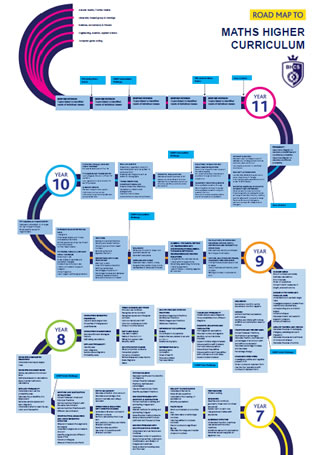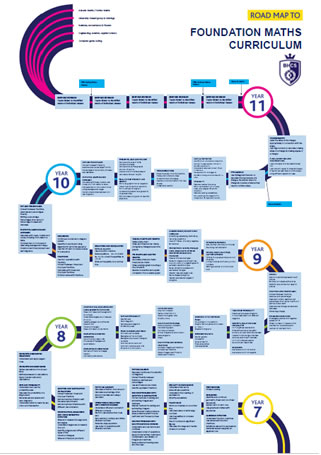Mathematics
- Mrs R Duffy - Head of Faculty
- Mr S Head-Riordan - Second in Faculty
- Mrs C Williams – Teacher of Mathematics
- Miss T Duemke – Teacher of Mathematics
- Mr P Beeching – Assistant Headteacher
- Ms K Bravo - Teacher of Mathematics (currently on maternity leave)
- Mr P Colmer - Teacher of Mathematics
- Mr C Reilly - Teacher of Mathematics / Lead Practitioner
- Miss Z Burn - Teacher of Mathematics and Health & Social Care
Our Vision
Our mission as a faculty is to foster and develop an interest in Mathematics through a varied and relevant curriculum. We aim to build a curriculum which enables students to study topics both within and outside of the National Curriculum to ensure they are prepared for real life situations and applications of Mathematics.
Key Stages 3 and 4
The sequence of learning has been planned carefully across Key Stage 3 and Key Stage 4 to ensure a smooth transition between key stages. We aim for students study the curriculum in a spiral approach; this allows them to continuously revisit previous learning and build on the foundations laid previously. The spiral approach is beneficial as it aids retention of knowledge and enables topics to be committed to students’ long-term memory.
Portable knowledge and vocabulary are highlighted to students and are used to make essential connections between different aspects of Mathematics. Every lesson taught within the faculty is underpinned by deep mathematical thinking from year 7 to year 11. Every lesson starts with an activity designed to retrieve previous understanding, this could be from the last lesson, the last topic or further back. These activities are sometimes stand-alone but often feed into the learning of the lesson.
Alongside the national curriculum topics, we aim to teach skills students need for life such as resilience, problem solving and strategic thinking skills. These are portable skills that students can then use throughout their time with us to help with unfamiliar problems or questions. As part of teaching problem solving skills, we encourage the students to represent problems in multiple ways; this could be through the use of concrete resources such as cubes or 3D shapes or by drawing pictures to represent their work. This allows the students to formulate their own ideas freely and aids the transition to more abstract concepts.
Home learning is carefully planned within the curriculum to provide students with an opportunity to practise, embed and apply the knowledge that they have been taught in lessons. Home learning is set on an online platform which provides students with immediate feedback and guidance in the form of notes and videos. Home learning is checked weekly and misconceptions are addressed during starts to lessons.
Key Stage 4 lessons take on a similar approach but with a greater emphasis on applying problem solving skills to multi-mark questions. These questions are where students need to make connections between topics and apply logical thinking to answer them step by step. Skilled and considered questioning is used by teaching staff to help students connect the dots and structure their answers.
Enrichment Opportunities
Enrichment activities are encouraged in the form of national competitions such as the United Kingdom Mathematics Trust challenges and puzzle of the week. In addition, we run an afterschool club designed to foster intrigue in Mathematics and explore real life applications which push beyond the basic curriculum. Previous sessions have looked at code breaking projects, origami, strategy games, artistic mathematics and problem-solving puzzles. Students who attend have the chance to represent the school at a team-challenge day where a group of four compete against other schools in the county by completing a variety of puzzles.
Assessment
All students are assessed at the end of a topic, usually a week after it has been taught to allow for revision and consolidation at home. Students have 12 designated assessments per year which is roughly 2 per half term however this can vary dependent on the length of topics.
Students are also assessed day to day in lesson by their teacher through questioning and conversation. This is a vital part of helping our students to make great progress.
GCSE
The Mathematics GCSE consists of two tiers, Foundation (grades 1 to 5) and Higher (grades 4 to 9). The GCSE consists of three papers each lasting 90 minutes and with 80 marks available per paper. Students must take all three papers on the same tier.
The papers are broken down into different topics however it is not known in advance what these topics will be, students have to be prepared to answer questions any topic studied during Key stage 3 and Key stage 4. Students are prepared for this through the use of retrieval assessments biannually from the start of year 7.


